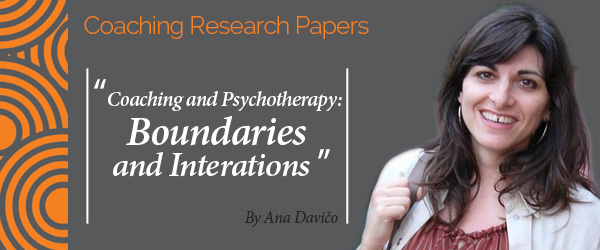A Coaching Power Tool created by Ana Davičo
(Life Coaching, SERBIA)
I – Introduction
This paper is intended as a modest contribution to the ongoing debate within the ICA community about the relationship between psychotherapy and coaching – their boundaries and interaction.
Distinguishing the boundaries is important in order to effectively address the needs of what psychotherapy and coaching undoubtedly have in common – and that is the client who is coming for help. With the client in mind, this paper also briefly examines the way in which psychotherapy and coaching complement each other in his best interest. Therefore, this paper also addresses their relation to each other within the group of helping professions.
The research was done in Serbia and all the respondents included in it are practicing professionals from Serbia. In this country, coaching – both the word and the concept – has been known for several years to the general public. Just from glancing at the many coaching websites that are springing up in the recent years, it is clear that coaching in Serbia is on the rise. There are various associations and educational centers that offer training of professionals in the field of coaching. However, the academic community has given it little if any attention: a recent review of domestic literature shows no articles about coaching published in professional journals or books in the Serbian language (Bogićević, 2013).
Apart from the fact that, when it comes to coaching, this is still an emerging market, and that it is some 15 to 20 years behind the international community in both practice and academic study, there is no particular professional or cultural specificity that sets apart Serbian professionals in the field of psychotherapy and coaching from their counterparts in other countries. All the teething problems of the coaching profession that accompanied its coming of age in, say, the U.S. or the UK, are present here as well: distrust, stigma, lack of understanding, dismissing it as superficial and unscientific, and overly marketing-oriented – on the one side, and accepting is as a welcome addition to the practical work with clients – on the other.
One could argue that the name “life coaching”, which still has no appropriate Serbian equivalent, suggests something imported and foreign, artificially grafted onto the local culture, fashionable and snobbish. This may be contributing to the slow acceptance of coaching as another legitimate option within the group of helping professions – by clients and colleagues alike.
II – Methodology
This is an exploratory qualitative research. Its goal is to offer an indication or a hint – and not more than that – of the attitudes that may exist in a larger population of professionals about this topic – based on the opinions received from a small non-stratified sample of six respondents.
They include three practicing psychotherapists, two life coaches and one psychological counselor.
It is based on the answers to seven open-ended questions (without answer categories; the respondents were asked to formulate the answers in their own words), filled in online or in face-to-face interview.
The questionnaire included the following questions:
- What is your definition of life coaching?
- Do you in your work use some of the techniques and tools from the repertoire of life coaching (goal setting models (e.g. GROW), wheel of life, resources/decisions grid, making of “to do” list, etc.)?
- What makes life coaching different from psychotherapy?
- What is the place of life coaching in the group of helping professions?
- In what situation would you refer a client from coaching to psychotherapy?
- In what situation would you refer a client from psychotherapy to coaching?
- If you had to name one main difference between coaching and psychotherapy, what would it be?
The research was conducted in June and July 2013 in Belgrade, Serbia.
III – Analysis of the results
Coaching encourages the mastering of life skills; it offers practical assistance in resolving the impasses of life.
Life skills, help, learning and development – are the key words in the answers given to the first question: your definition of life coaching.
The prevailing opinion is that coaching is the learning of life skills. Moreover, it is described as “affective, emotional education” with a “very prominent” didactic component. The likely assumption behind this is that the client in coaching is someone who is able and willing to learn, that is, “an acting being, able of dealing with challenges and problems.”
